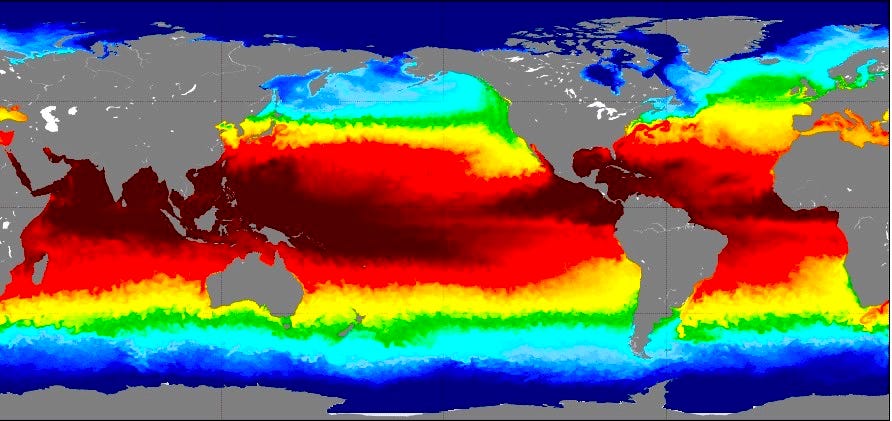
(Click on graphic to enlarge) The oceans are the beating heart of the Earth. They gave birth to life and create the climatic conditions that enabled humanity to thrive. Although we give them different names—the Atlantic, the Pacific—there is only one vast, interconnected Ocean that covers 70% of the Earth.
Need-to-Know: Something is very wrong with Ocean right now.
Ocean is far too hot. For the last three months, the top 2000 meters of Ocean have been the hottest ever recorded. And not just a little hotter; way, way hotter as the scientists say. As you can see in the graph below, there is a big gap between what are regular climate-change-impacted water temperatures over the last 40 years and today.

What is going on? What does this mean?
The 620 billion tons of CO2 and other greenhouse gases we’ve pumped into the atmosphere trap a staggering amount of heat from the sun. We would have dealt with climate change long ago (or succumbed to catastrophic levels of rapid heating) if not for Ocean absorbing 90% of that extra heat energy.
Need-to-Know: Ocean has saved our asses for 30 years
By soaking up so much extra heat Ocean gave us 20 or 30 years of breathing room to come to our senses and sort out our problem of industriously trying to fry our own asses, along with everything else.
Sadly we haven’t used that time wisely.
Consider the scale of what Ocean has done for us:
Last year, Ocean absorbed about 11 zetajoules worth of extra heat-energy from all the CO2 and stuff we’ve added. (1 zetajoule is equivalent to 10 times the world’s electricity generation in 2021.)
Since we keep adding more heat-trapping stuff to the atmosphere, the 11 zetajoules added in 2022, was 10% more than the year before.
Ocean takes that heat and buries it in its dark, cold depths normally for decades to centuries.
Over the last 50 years scientists estimate that Ocean has absorbed an astonishing 400 jetajoules of heat energy. (Imagine if we could extract all that energy and use it !!)
Ocean wouldn’t mind if we took back some of that heat-energy.
Marine life generally prefers cool to cold water. Corals don’t like hot water, and tropical corals will suffer badly this year with a record-hot Ocean. Marine life in general has been fleeing too-hot tropical regions, making life difficult for a billion or so people in the region who depend on local fish for their livelihood and food.
Need-to-Know: The Colossal-Heat-Monster Kraken is coming
Now it seems the long-buried Colossal-Heat-Monster Kraken that was hidden in Ocean’s deep, dark depths is coming to the surface where we live. That’s what it looks like right now. No one thinks it’s a good sign.
Ocean transports heat around the Earth, acting as a kind of radiator and moderating temperatures on land. During the recent three-year La Nina event Ocean brought up some cold water from the depths and that cooled things off for us on the surface. (See La Nina-El Niño explanation below*.)
The last three years were still amongst the hottest years because there is still that pesky 10% of extra heat that stays in the atmosphere. And every year there’s more heat being trapped there. But overall it hasn’t been record-hot thanks to the largely cooler water in our global radiator.
Need-to-Know: Uncharted waters ahead—the cold water tap is off and the hot is being turned on
Last March, Ocean turned off the cold water tap. Ocean’s surface temperature quickly became record-hot and it has stayed that way. The big worry is what happens when Ocean turns on the hot water tap as it does during an El Niño event? This could start in the next month or two.
So, we’re about to endure a major shift in climatic conditions globally this summer and into next year. We’re in uncharted waters climatologically with a major El Niño event on top of record-hot water temperatures.
So what does this mean?
It’s almost certain the average global temperature will rise to 1.4C or 1.5C. It should be temporary, lasting only as long as the El Niño event does. That’s a big jump from the current 1.2C. Keep in mind temperatures on land are always far hotter. The still-cool/cold waters of Ocean really pull down the global average.
What else to expect? More extreme weather, and sometimes in unexpected places. It is really hard to predict because Ocean is much hotter than previous El Niños.
Need-to-Know: The past 2000 years cannot be our guide in the Anthropocene**
Sadly, by changing the fundamental conditions for life on Earth, we can’t rely on the past as our guide to the present or the future.
Until next time be well.
Stephen
* The El Niño–Southern Oscillation (ENSO) cycle is the largest natural climate fluctuation on Earth. The La Nina is the cool phase of the cycle, while El Niño is the warm phase. Each can last a few months to 3 years.
** Anthropocene is the most recent period in Earth's history when human activity started to have a significant impact on the planet's climate and ecosystems.
Welcome to Need to Know: Science & Insight, my personal newsletter that looks at what we Need-to-Know at this time of pandemic, climate emergency and unraveling of nature’s life supports


